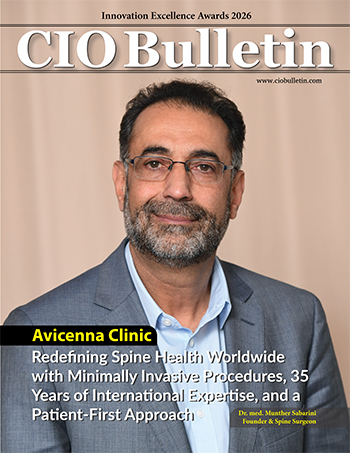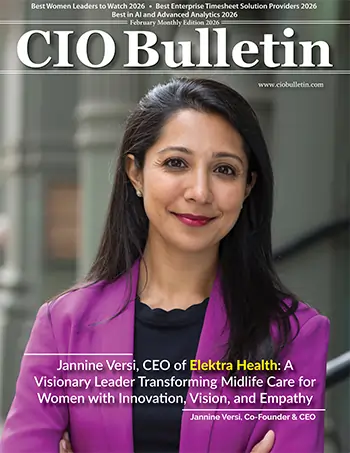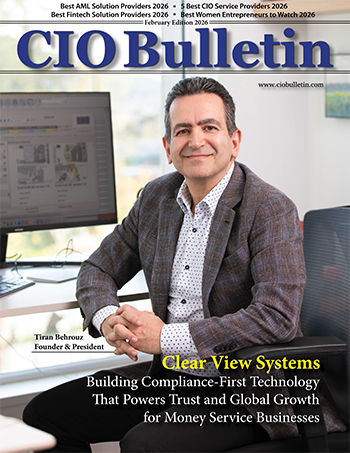Home Technology Security The Art of Balancing Privacy a...
Security

CIO Bulletin
16 August, 2025
-Robert Davis
In today’s increasingly digital and regulated economy, businesses walk a fine line. They must protect customer data by strict privacy laws while also collecting sufficient information to detect and prevent financial crime.
As data breaches and fraud threats escalate, compliance has become both a necessity and a strategic imperative.
At the center of this complex intersection is Eduardo Monteverde, a legal and compliance expert who has built a career balancing the competing demands of data privacy and anti-money laundering (AML). With a rare dual specialization, Monteverde has become a trusted advisor to companies navigating the regulatory maze.
“Privacy and anti-money laundering pull in opposite directions,” Monteverde explains. “But when balanced correctly, they can protect both people and progress.”
Among Monteverde’s notable successes is his work with the IAPP, where, as a Data Privacy Legal Extern, he developed a global roadmap for cross-border data transfer compliance. This initiative helped IAPP’s global membership avoid an estimated $10 million annually in regulatory fines, by equipping them with practical tools to navigate complex privacy laws like GDPR, LGPD, and PIPL.
His role in reducing AML (Anti-Money Laundering) alerts by 50% at Morgan Stanley, an international bank, where he collaborated with Wealth Management Business Units to strengthen compliance protocols across the Americas.
In parallel, at Pagotronic LLC, a Miami-based fintech company, he serves as a Legal Operations Advisor, where he led the overhaul of core compliance programs. His efforts resulted in a 50% improvement in overall regulatory compliance and a 50% optimization of internal processes by streamlining coordination across departments, including Marketing, IT, and the executive team.
“I focus on providing lean, resourceful solutions tailored to a company’s size and needs,” he shares.
“Whether I’m helping a startup avoid costly compliance pitfalls or improving workflows at a global bank, my goal is always to reduce risk and create operational clarity”.
Data privacy laws, such as the GDPR (General Data Protection Regulation) and the CCPA (California Consumer Privacy Act), require minimal data collection and robust protections, while AML regulations, including the Bank Secrecy Act (BSA), necessitate the collection of extensive customer information to detect illicit activities. This tension creates a paradox for businesses, particularly in finance and fintech.
Monteverde, with his extensive experience in Anti-Money Laundering (AML) and data privacy compliance at Morgan Stanley and Pagotronic, has developed strategies that reconcile these often conflicting demands.
At Morgan Stanley, he focused on strengthening AML protocols to detect and prevent financial crime, while at Pagotronic, he enhanced privacy and compliance frameworks for a growing fintech operation.
“The challenge,” Monteverde explains, “was to collect what’s necessary for AML without overstepping privacy boundaries. You need enough data to detect and prevent financial crime, but not so much that you expose people to unnecessary risk or violate their rights. It’s a balancing act between protection and restraint.”
He also served as a Wealth Management BSA/AML Risk Consultant, Monteverde spearheaded a compliance overhaul that reduced alerts by 50% across the Americas and achieved a 95% program success rate.
Andreina Nicolosi, Director of AML Compliance at Snowden Lane Partners. She supervised Eduardo A. Monteverde Eraso during his tenure at Morgan Stanley, where he was part of her AML Risk Team for Wealth Management and U.S. Banks in Latin America.
“Eduardo demonstrated exceptional analytical skills,” Nicolosi says, “attention to detail, and a deep understanding of complex international legal and financial structures.”
“His ability to interpret foreign legal documents and corporate structures was especially valuable in our work with high net-worth individuals from Latin America and other high-risk jurisdictions.”
By streamlining data collection practices, he helped financial advisors focus on gathering only essential information—meeting regulatory demands without compromising individual privacy. This precision not only aligned with evolving privacy standards but also slashed false positives, saving the firm valuable time and resources.
Monteverde’s work at Pagotronic further showcases his ability to bridge the often conflicting demands of privacy and anti-money laundering. As Legal Operations Advisor, he optimized compliance programs by 50%, working closely with IT, marketing, and C-suite teams to implement lean data practices that were both effective and unobtrusive.
“It’s about finding the sweet spot,” Monteverde says, “where compliance is robust but not intrusive. You want to protect the financial system and meet regulatory expectations—but not at the cost of eroding user trust or collecting data you don’t actually need. Smart compliance is precise, respectful, and strategic.”
His frameworks have helped fintech clients steer clear of costly fines while building a reputation for integrity and transparency. In doing so, Monteverde has proven that privacy and AML can not only coexist—they can reinforce one another when guided by thoughtful design.
Monteverde’s dual expertise enables him to design holistic compliance frameworks that address both privacy and AML risks. His certifications—CIPP/E, CIPP/US, and CIPM from the IAPP, and CAMS from the Association of Certified Anti-Money Laundering Specialists (ACAMS)—equip him with a deep understanding of global regulations. His Master of Laws from Northeastern University further enhances his ability to craft legally sound solutions.
Monteverde’s strategic thinking was on full display during his tenure as a Data Privacy Legal Extern at IAPP. There, he crafted a global roadmap for cross-border data transfers that helped members avoid an estimated $10 million in regulatory fines by aligning with GDPR, LGPD, and other major privacy laws.
The roadmap introduced data minimization strategies that complemented AML protocols—allowing businesses to verify identities efficiently without over-collecting personal information.
“Compliance is a puzzle,” Monteverde says. “You need every piece to fit—not just legally, but operationally. If privacy policies ignore AML realities, or AML systems overlook privacy rights, the whole framework cracks. My job is to connect those pieces—to design compliance systems that are cohesive, defensible, and built for the real world.”
This integrative mindset, honed across sectors from fintech to utilities, has become a hallmark of Monteverde’s approach to legal operations and risk management.
Seth Litwack, a senior legal expert in privacy and data responsibility, has worked closely with Eduardo Monteverde Eraso since January 2025 as co-leaders, organizing multiple high-profile events on privacy and regulatory compliance.
“Eduardo brings a distinctive and deeply valuable perspective to our work.” Seth says.
“His ability to bridge anti-money laundering (AML) frameworks with data protection principles offers a rare and insightful approach to regulatory compliance.”
For a U.S.-based fintech client at Pagotronic, Monteverde designed an innovative compliance framework that was inspired by the successful merger of GDPR’s strict consent requirements with AML’s know-your-customer (KYC) protocols. Drawing on his cross-sector experience—from advising law firms in Latin America to managing high-stakes compliance at Morgan Stanley—he crafted a system that used anonymized data for trend analysis while limiting the exposure of personally identifiable information (PII) during transaction monitoring.
“The goal is to protect customers from both data breaches and financial crime.” Monteverde emphasizes.
“You don’t have to choose one or the other. If you apply the right principles—like data minimization, purpose limitation, and contextual risk assessment—you can meet global privacy standards and still uncover suspicious behavior before it escalates.”
This dual-focus strategy not only reduced privacy risks but also maintained strong fraud detection capabilities. The results speak for themselves: Monteverde’s frameworks have improved compliance outcomes by 65% for IAPP members and by 50% at Pagotronic, proving that privacy and security can reinforce—not compromise—each other.
Monteverde’s success stems in large part from his ability to foster cross-functional collaboration—an essential skill in the complex world of compliance. Data privacy and AML regulations often demand the coordinated efforts of legal, IT, cybersecurity, and business operations teams. Yet in many organizations, these groups operate in silos, slowing progress and increasing risk. Monteverde, who has worked across industries from utilities to fintech, understands the value of breaking down those barriers.
As KnowledgeNet New York Chapter Chair for the IAPP, he actively convenes professionals from law, cybersecurity, and data engineering to tackle evolving challenges in privacy and AI governance.
“Compliance isn’t a solo effort,” Monteverde asserts. “It’s a team sport. You need legal minds to interpret regulations, engineers to implement the systems, and business leaders to keep it practical. When those voices come together, that’s when compliance becomes sustainable, proactive, and truly valuable.”
At PSE&G (Public Service Electric and Gas Company), where he serves as Senior Analyst in Contract Administration, Monteverde collaborates with legal, procurement, and risk management teams to assist with the management of complex contracts.
His work reduced disputes by 75% and improved milestone completion by 78%, partly by ensuring suppliers adhered to data protection and financial compliance standards.
“When everyone understands the stakes,” Monteverde says, “compliance becomes seamless.
“It’s not about forcing rules on people—it’s about showing them why those rules matter. Whether it’s preventing identity theft, protecting company reputation, or keeping a license to operate, once teams see how their role contributes to the bigger picture, they become active partners in the process.”
Dr. José Ignacio Hernández, a leading scholar in sovereign governance and former Special Attorney General of Venezuela. He first met Eduardo Monteverde as his student in 2014 and later collaborated with him on pro bono legal reforms focused on Venezuela’s democratic and institutional recovery.
“Eduardo’s work spans legislative drafting,” Hernandez says.
“Human rights advocacy, and economic reconstruction—domains often siloed, yet in his case, seamlessly integrated. His ability to synthesize complex legal regimes across borders and deliver policy solutions with immediate humanitarian and regulatory impact demonstrates a rare mastery of balancing competing frameworks—such as privacy rights and enforcement obligations—in a way that is both principled and practical.”
This collaborative approach extends to his AML efforts. At Morgan Stanley, Monteverde worked with wealth management units to streamline onboarding, ensuring KYC data collection was efficient and privacy-compliant.
For a Latin American client, he coordinated with IT to implement secure data storage, reducing breach risks while meeting AML reporting requirements. His ability to align diverse teams has made him a trusted partner in corporate compliance.
“I collaborated with technical teams to retrieve and secure the compromised data, negotiating with vendors to implement key logs and recovery tools.” He explains.
“We not only restored the information but also strengthened safeguards to prevent future attacks.”
Monteverde’s forward-thinking mindset sets him apart in a field where risks and technologies evolve at breakneck speed. As a member of ACAMS—the leading global association for anti-money laundering and financial crime professionals—he regularly contributes to conversations on emerging threats, including deepfake fraud, where criminals use AI-generated identities to bypass know-your-customer (KYC) verification systems.
With experience spanning from legal clerkships in Venezuela to compliance leadership roles in U.S. fintech and utility sectors, Monteverde brings both global perspective and operational insight to these challenges.
“Technology is a double-edged sword,” he observes. “It empowers innovation, streamlines compliance, and expands access—but it also enables new forms of crime we’ve never seen before.
“The key is to build systems that embrace these tools responsibly. AI can enhance fraud detection, yes, but only if it’s governed by privacy-by-design principles that ensure people’s data remains secure.”
Professor Jared Hubbard, General Counsel of a multinational digital identity firm and adjunct law professor. He taught Eduardo Monteverde in a 2021 LL.M. course on International Business Transactions and later mentored him as Eduardo advanced into global privacy and compliance work.
“Shortly after my class, Eduardo undertook a Co-Op with the International Association of Privacy Professionals,” Hubbard says.
“Where he developed a global compliance matrix that now guides more than eight thousand privacy officers in reconciling the GDPR, Brazil’s LGPD, China’s PIPL, and the rapidly expanding patchwork of U.S. state privacy statutes—an innovation conservatively estimated to avert ten million dollars in annual fines.”
At Pagotronic, Monteverde is piloting automating compliance tools that anonymize data for AML analysis, reducing privacy risks.
“We’re moving toward systems that think ahead of regulators and criminals,” Monteverde predicts.
“The future of compliance lies in anticipating, not just reacting. This means using technology to identify risks before they materialize and designing policies that evolve in response to emerging threats. But it also means building ethical frameworks so innovation doesn’t outpace accountability.”
His experience as General Counsel at AMR Construcciones, where he saved $2 million annually as Data Protection Officer, informs his proactive approach. By anticipating risks—like GDPR fines or AML sanctions—he helps businesses stay ahead of the curve.
Monteverde says this tenure was a pivotal chapter in his career. His strategic oversight of legal matters further safeguarded the company’s interests, delivering approximately $6 million in yearly savings through effective risk management and dispute resolution.
Monteverde’s mentorship amplifies his impact. He guides young professionals at IAPP, emphasizing the need to balance technical and legal skills.
“Compliance isn’t just a legal checkbox anymore—it’s where law, technology, and ethics converge,” Monteverde advises.
“You can’t just throw lawyers at a problem anymore. You need engineers, data analysts, cybersecurity specialists, operations managers—people who understand the systems behind the rules. Only by bringing those perspectives together can you build compliance programs that are not only effective, but also scalable and resilient.”
Monteverde’s commitment to mentorship is a defining feature of his professional journey. He actively supports the growth of young professionals, particularly in the fields of data privacy and anti-money laundering.
His approach blends practical guidance with strategic foresight, helping mentees navigate complex career decisions.
IAPP New York chapter, Monteverde engages with emerging professionals at events and forums.
“I was getting a lot of questions during an event from newly graduated lawyers interested in data privacy,” he shares.
“They’d ask, ‘Do I need to get a certification in AI?’ I’d tell them—don’t rush. Focus on foundational knowledge first, then build from there.”
His impact extends beyond privacy. In the anti-money laundering space, he has coordinated grassroots discussions with fellow professionals through ACAMS, fostering in-depth exchanges on challenges like deepfake fraud and financial crime risk. These peer-led sessions reflect his belief in practical, solution-oriented learning.
Monteverde currently mentors two recent graduates, advising them on building core competencies and expanding their networks. He cautions against premature specialization and encourages thoughtful exploration of the field before committing to certifications.
“I want to be remembered as a mentor, someone who helped others move forward,” He says.
“I don’t mind helping you, but I won’t cut corners. I’ll support you in doing the hard work so you can reach your full potential.”
Seth Litwack, is Senior Counsel for Privacy, AI, and Data Responsibility. He has been co-leader of the IAPP New York KnowledgeNet chapter alongside Monteverde.
He says: “Eduardo is a compassionate mentor and cooperative partner. I have directly seen his dedication to guiding emerging IAPP members and assisting them in advancing their careers within the privacy sector."
Litwack adds: “Eduardo also offers a unique and profoundly beneficial viewpoint to our initiatives. His talent for integrating anti-money laundering (AML) systems with data privacy guidelines offers an uncommon and perceptive approach to achieving regulatory compliance.
“His input aids in demystifying the frequently intricate dynamics between enforcement strategies and the everyday challenges of protecting personal information, especially within niche and elevated-risk sectors.”
Whether through certification, leadership, or personal mentorship, Monteverde continues to invest in the next generation of professionals—equipping them with the tools, context, and clarity needed to lead in high-stakes environments.
Monteverde’s dual expertise in privacy and AML is reshaping corporate compliance. His ability to craft holistic frameworks, foster collaboration, and anticipate threats offers a model for businesses in a data-driven world.
As privacy and AML regulations continue to tighten worldwide, Monteverde’s strategic playbook offers more than just guidance—it provides a lifeline for organizations navigating uncertainty. His frameworks don’t just help companies stay compliant; they empower them to lead with integrity and resilience.
“Compliance done right isn’t a burden—it’s a competitive edge,” Monteverde concludes.
“When businesses embed privacy and AML into their core operations, they’re not just avoiding fines—they’re building trust, strengthening systems, and positioning themselves to grow responsibly. The smartest companies won’t just adapt to regulation—they’ll outperform because of it.”
His legacy is a corporate landscape where businesses shield consumers from both data breaches and financial crime—thriving not in spite of regulation, but because they’ve mastered it.

Insurance and capital markets







